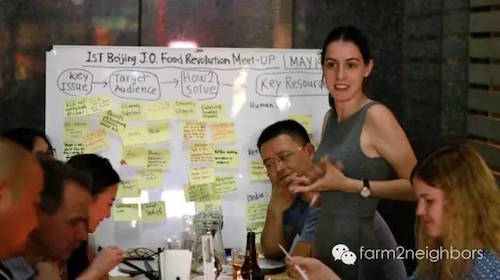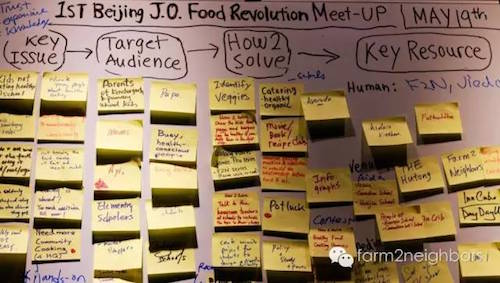When Erica Huang of Farm to Neighbors moved to Beijing, she started developing skin and health issues. She could hardly recognize herself in the mirror after living here for a year.
The doctor gave her a hard choice: take a strong drug with serious after-affects or start the paleo diet.

The paleo diet is based on the principles of only eating food our archaic ancestors could get on their own: meat and organic vegetables, essentially. Through the change in diet, Huang befriended a woman who supplied fresh produce for international schools. During the following summer break and in order to prevent the drop in trade her friend was experiencing, Huang organized a small sale in the hutong area, inviting all her friends to come. The idea became popular among other farmers, and that’s how the Farm to Neighbors weekend fair was born.

The mission of the Farm to Neighbors team is to educate the masses about food, with a focus on a sustainable and nourishing lifestyle to improve body and mind. Changing people’s conception and habits of eating is challenging, but is also crucial now for both human and environmental wellbeing.
Huang now heads the Beijing branch of Jamie Oliver's Food Revolution, a project started by the world-famous UK chef to help provide children with healthy nourishment instead of junk food, and an understanding of food culture among children and adults. Oliver started the campaign a year ago in unison with the launch of a TV show which goes by the same name. In the program he travels around US and UK schools, persuading students, their families, and staff of the importance of the right eating habits, proving it with data about childhood obesity. The results were satisfying – he managed to change school lunch menus and draw public attention to ongoing problems in Western countries. However, Western and Asian approaches are not the same, and China needs to find its specific way to eat healthy food.
With this vision in mind, Huang set up the first volunteer meeting, which took place earlier in the month. Everyone who attended went through a selection process to ensure that they had significant interest in the campaign and that they could provide potential benefits through their work or personal projects. The volunteers included chefs, restaurant owners, farmers, a yoga instructor, an international law specialist, software developers, a graphic designer, and an international school professor.

As Huang and her team members shared their interest in Jamie Oliver’s Food Revolution project, they agreed to follow its main principles and ideas, along with adapting to Chinese traditions for greater impact in Beijing.
While discussing Beijing’s food culture, they mentioned that “healthy food” sounds boring and unattractive to children – which comes from their parents, who don’t have a real understanding of what “healthy food” means. Another key issue is that there’s no guarantee of observance of basic sanitary norms in many street food stands. People also have no trust in“green food” producers. The hardest issue is that “healthy eating”is considered to only be applicable to wealthy citizens.
After this discussion, Huang gave everyone feedback on what was already done in order to promote Food Revolution. One of the first things was a translation of Jamie Oliver’s song to Chinese. It is much harder with the top 10 recipes, which are better known in the West. These are simple, tasty and nutritious food recipes that are a must-know for each family and are enough to set up a healthy and varied diet. However, they may not be as popular or easy to prepare in China due to differences in food culture.

So the main objective for the Food Revolution volunteer team is to create analogs to these recipes that will find a positive feedback among Chinese citizens. “It can all be summed up into three sentences: ‘Eat real food. Not too much. Mostly plants.’
“And traditional Chinese recipes are just what we need,” commented Jamie, a chef. “They include specific sauces and a special way of vegetable preparation, adding a unique taste and aroma to every dish.”
During the brainstorming, a few other good ideas arose. Sharing days of healthy lunch preparation with your colleagues, for example, is not time-consuming. Or a good way of making others think of what they eat can be a so-called “mindful yoga session” where one is taught to distinguish the taste of every piece of food chewed.

The strong side of the Food Revolution activist team is that they all have a great passion for what they are doing and a vigorous desire to spread healthy food thinking around. The future plans include attracting more interested people. They hope to attract young families, students looking for inspiration for their school projects, and all busy people who have little time to think about their health.The team plans to hold a Food Revolution meeting every month. Those who feel enthusiastic about joining the project and would like to attend future meetings, can contact Huang directly by WeChat or telephone (186 0011 6714).
This article originally appeared on our sister site beijingkids.
Photos: fingerlickingfit.com, Farm to Neighbors (Weibo)
